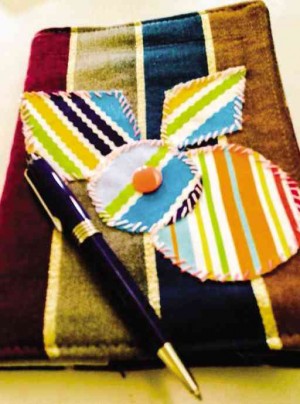
BETTER THAN BRAND-NEW This recycled notebook from the winning project looks many times more attractive than the typical items sold in stores.
Fifteen-year-old Jullo Babagay had long been bothered by the garbage problem in their community in Rodriguez, Rizal province. Not only is the town (formerly known as Montalban) the site of a dump for Metro Manila’s garbage, but many of its own residents seem indifferent when it comes to proper waste disposal, he noted.
“As a result, we’ve been experiencing floods despite our relatively high location,” the boy said, referring to the perennial urban problem caused by trash-clogged drainage systems and waterways. “After the waters subside, people would promise to be more disciplined. But after a while, everything’s forgotten and we’re back to the old ways.”
This ugly cycle prompted Babagay to look for ways to reduce waste, starting in his campus.
Babagay and other students noticed that, at the end of each school year, they always have a lot of unused pages left in their notebooks. “What a waste if we would just throw them away and keep buying new ones.”
With the help of Silid Aralan Inc., a group advocating social entrepreneurship and a partner of telecom giant Smart Communications Inc., and other members of the community, Babagay and three of his classmates set up the Notebook Xchange Project. With him on the team were Vanjelyn Jadulco, 15; Joy Sonajo, 16; and Mary Flor Dulay, 16.
“First, we gathered leftover pages from old notebooks. Other public and private schools in our area later became our partners in the project and their students started donating their unused notebook pages to us,” he recalled.
Youth leader Jullo Babagay explains the success of his project, which arose from the need to address his community’s garbage problem.
The youth volunteers then came up with designs for notebook covers using scrap cloth, buttons, yarn and other recyclable materials. Parents pitched in by sewing the recycled pages and covers together.
The finished products were then sold at local bazaars and even on e-commerce sites.
About 70 percent of the proceeds from the sale of the notebooks went to the Notebook Xchange fund, 20 percent to the personal savings of Babagay and his team mates, and the remaining 10 percent to Silid Aralan for its educational outreach program.
Babagay’s mentors from Silid Aralan later encouraged him to submit Notebook Xchange as an entry to “payITfwd,” a competition initiated by Smart to promote social development projects. Participants were asked to submit entries in the form of a video explaining the project, how it helped the community, and how Smart’s technology and grants could further enhance the results.
Notebook Xchange made it to the Top 10 out of about a hundred entries.
Smart rewarded each of the 10 winning projects with a technology grant of P50,000 and five tablet computers, with Smart Bro enabling the devices’ connectivity through Smart Pocket Wi-Fi and P3,000 worth of load credit.
The young volunteers and parents behind the award-winning Notebook Xchange project get busy putting together unused pages donated by partner schools in Rodriguez, Rizal province. CONTRIBUTED PHOTOS
“We’re very happy to be chosen,” Babagay said. “Aside from addressing the garbage problem in our community through recycling, this project also enabled the youth to become productive.”
After the win, people started taking the Notebook Xchange project more seriously, resulting in more volunteers and partners. “Recently, we partnered with a big paper company, which now donates its excess paper to us,” Babagay said.
Best of all, more orders came in for the colorful, recycled notebooks.
Part of the technology grant also helped the team members defray the project expenses, like the cost of traveling around town to gather recyclable notebooks from partner schools.
“Five years from now, we hope to have Notebook Xchange products available all over the Philippines. Through the help of our mentors, we’ve been talking to (the sales people of) bookstores and coffee shops that can make Notebook Xchange products available to more people,” he said.
Smart is currently accepting entries for the second round of payITfwd. For details, visit www.smart.com.ph/payITfwd.